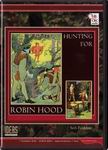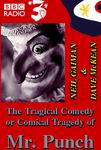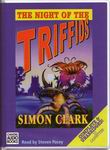

 V For Vendetta
V For Vendetta
Novelization by Steve Moore; Read by Simon Vance
11 Cassettes, 8 CDs or 1 MP3-CD – 9.5 Hours [UNABRIDGED]
Publisher: Blackstone Audio
Published: 2006
ISBN: 0786144637 (Cassette), 0786170777 (CDs), 078617711X (MP3-CD)
Themes: / Science Fiction / Dystopia / Terrorism / Anarchy / England /
“Remember, remember the fifth of November, The Gunpowder Treason and plot. I know of no reason why The Gunpowder Treason should ever be forgot…”
This audiobook had a long and treacherous road to release. Perhaps even worse, it has a questionable provenance. V For Vendetta, the unabridged audiobook, is several steps removed from the original source material. Worse still, the adapted property has been completely disowned by its original creator, celebrated graphic comics writer Alan Moore. He quite literally had his name removed from the movie credits, the novelization, and consequently this audiobook – in short he wants nothing to do with it.
Alan Moore is a famous figure in comics, and his opinion carries much weight among comic book readers. Because of all this, V For Vendetta, the novelization of the movie of the same name, is in serious jeopardy of being dismissed. But given the original material’s quality and the near classic vintage – the character and setting for “V” was originally birthed in early 1980s – you might be inclined to give this audiobook a try anyway. And for that you will be rewarded.
The road to release began with The Wachowski Brothers, the creators of the film The Matrix, optioned the story. They purchased the rights and scripturally adapted the graphic novel of V For Vendetta for the screen. After the film began production their script was then again adapted, this time as a movie novelization (or as the industry calls it a movie tie-in novel). The novel was written by Steve Moore, who, while no familial relation to Alan Moore, is very much his friend. Then Blackstone Audiobooks stepped in, hiring Simon Vance to voice an unabridged audiobook version of the Steve Moore’s novelization of The Wachowski Brother’s script of their movie which was originally based on Alan Moore’s original comic book series (that was collected into a graphic novel). See what I mean about a treacherous road? At any point along this journey the story could have been ruined. But what happened instead is that it has been IMPROVED! Indeed I think story-wise this is the best version of V For Vendetta…
Soon after the opening of the novel a mysterious figure named “V,” who dresses in a Guy Fawkes costume, promises to destroy the British Parliament buildings on November 5th, one year hence. It is a bit unlear at first, is the fascist governing party the target of this threat, or perhaps it is the people of England in general? Only one woman has even a clue. Her name is Evey. With war raging round the world, an English supremacist party called “Norsefire” has fully secured governmental authority in England. Some time ago, Norsefire successfully seized the initiative, and now England’s remaining citizenry are in a stranglehold of their own making. At the start of the novel the government controls media and a petrifying secret police force seemingly made up of little more than street thugs prowls the streets after dark. In the recent past the last of the last of the concentration camps has closed – their grisly work completed. The populace has been lulled into their docility by a combination of mindless television drama, propaganda posing as opinion, and horrifying news stories about how much worse everywhere else is. So when an anarchic revolutionary destroys London’s Saint Paul’s Catherdral in pyrotechnic display, the compliant populace is only slightly stirred. The government explains that it was just a “scheduled demolition” and many Britons even believe it. But when “V,” a seeming superhero/supervillan goes on BTN the sole governmental television network, and announces a violent campaign to be capped in by the destruction of parliament buildings in one year’s time the populace begins to question if “England shall prevail” or whether it even should.
Like George Orwell‘s classic dystopia 1984 the totalitarian regime in V For Vendetta rose to power by exploiting people’s worst fears and firing-up their prejudices. Interestingly the viewpoint character is not V himself. V’s personal history, past a certain point, remains mysterious right to the end. Despite a completely third person perspective we basically follow a young woman named Evey through this tale. V saves Evey early on in the novel from a rape by government agents known as “Fingermen.” Evey’s journey is not unlike that of the population, for which she can serve as an emotional example. One other character, a police Inspector named Finch, as dutiful and honest a detective as one’d want, offers another view of that same populace coming to grips with the type of society in which it lives. Finch is assigned to pursue the mystery of V, and in so doing unravels the history of the party’s origins and V’s vendetta. About two-thirds of the way through Evey’s journey with V and his vendetta Evey is captured and tortured. Her only solace during her ordeal is a scrap of toliet paper with a moving biography of her neighboring victim. The payoff from this is extremely surprising, utterly transendant and I think probably even true. There isn’t enough praise to go round for this one, Alan Moore for originally writing it of course, the Wachowski Brothers for recognizing it and popularizing it and Steve Moore for preserving and enhancing it. They all deserve major public honours here.
On the audiobook end, Simon Vance is my new favorite British narrator. The Shakespearean inspired “V-speech” that he delivers near the beginning of this audiobook is without parallel in my experience. It’s deliciously composed, elegantly constructed and with Vance’s performance, wonderfully delivered. The film version of this same speech is very good too, but I actually found myself better able to follow it via Vance’s excellent enunciated delivery. Steve Moore, the adaptor of the film’s script, has done something special. He’s taken many inspired liberties with the script by filling in as much detail as he could to flesh out the story – nearly every effective new addition to the story was taken from the original source material the comic book version of V For Vendetta. Finally, I can thankfully say that the plot detail involving the destruction of the British parliament buildings (including London’s Big Ben) is preserved from the film version. This is extremely important. To be sure there is a scene of the destruction of the British parliament buildings in the original graphic novel but the timing of it there is far less effective in terms of a story’s arc. Though it might be controversial to say, I think it is true: The Wachowski Brothers, in their adaptation of Alan Moore’s story, clearly understood the power of terrorism better than Alan Moore himself did at the time of the comic’s writing. The goal of terrorists is to show that an authority cannot control the terrorists. When a terrorist threat, like the destruction of a weighty architechtural symbol, is made and then carried out that effect is achieved. Some fear comes from a lurking dread of some muzzy non-specific threat but true political power stems from being able to call every shot, make the predictions on destruction and have them all come true every single time. In rejigging the story to make the destruction of the British parliament buildings happen near the end instead of the start, the already powerful story of V For Vendetta is vastly improved. An SFFaudio Essential.
Posted by Jesse Willis






 Doomsday Book
Doomsday Book